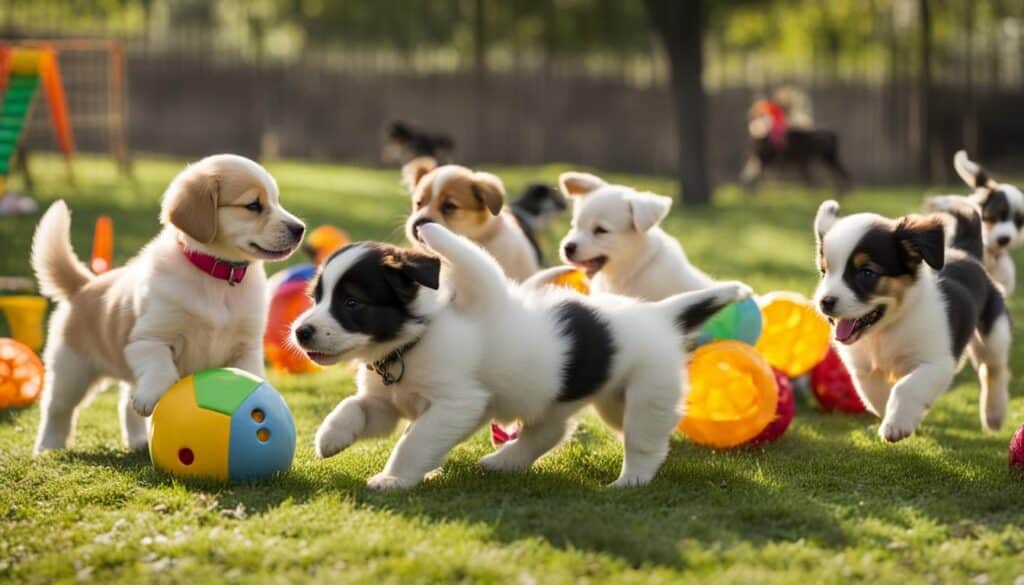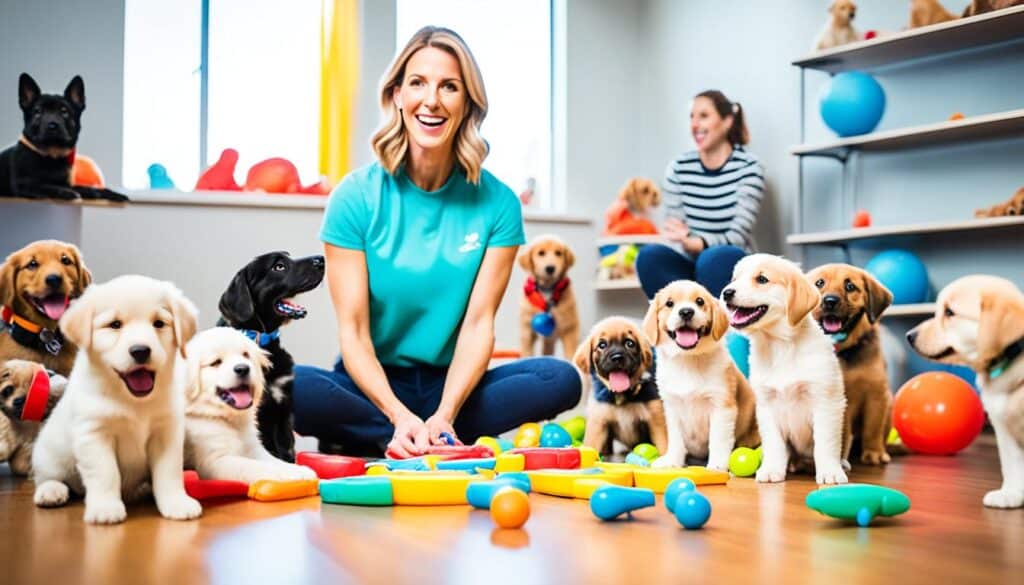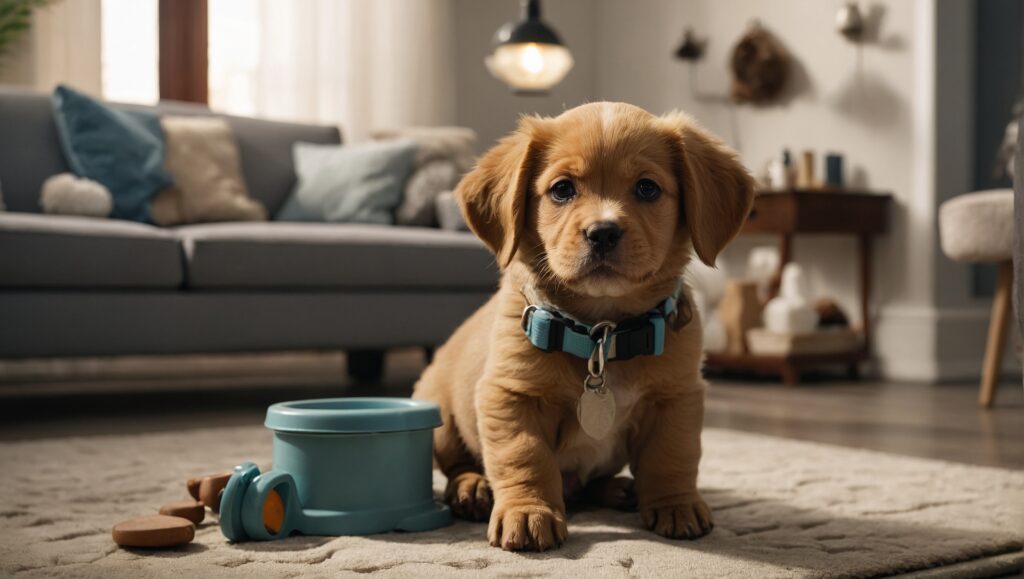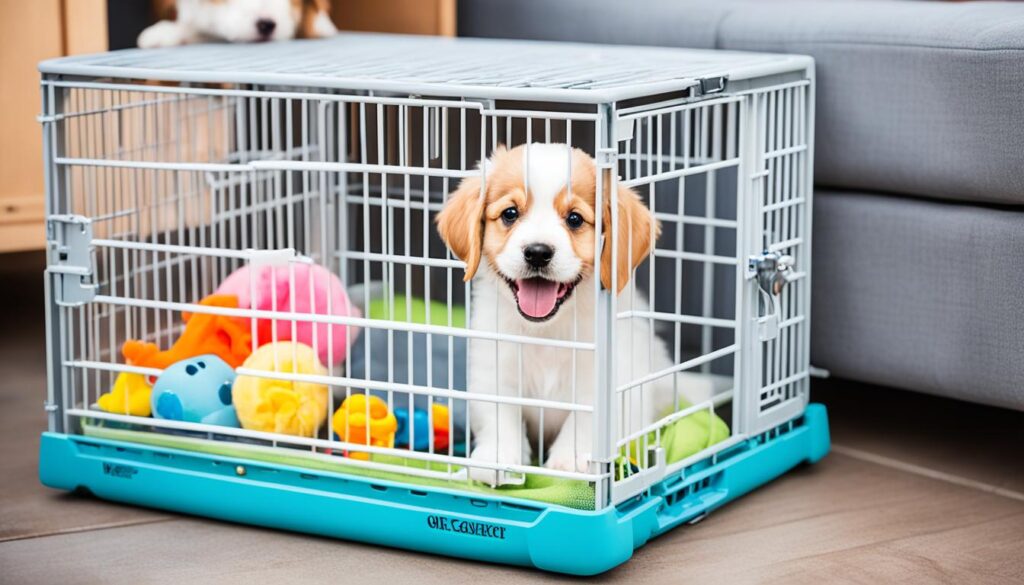
How to Socialize Your Puppy for Success: The Ultimate Guide to Puppy Socialization. Puppy socialization is a crucial aspect of raising a well-rounded and confident dog. In this ultimate guide, we will explore the importance of puppy socialization and provide you with the essential steps to successfully socialize your puppy.
From understanding the socialization period and its impact on your puppy’s development to introducing your puppy to people and other animals, choosing suitable puppy classes, and avoiding common mistakes, this guide covers everything you need to know to ensure your puppy’s socialization journey is successful.
Key Takeaways:
- Puppy socialization is crucial for raising a well-rounded and confident dog.
- The socialization period is a critical time for your puppy’s development.
- Introduce your puppy to people and other animals gradually and positively.
- Choosing suitable puppy classes can enhance your puppy’s socialization experience.
- Avoid common mistakes and follow expert guidelines for successful puppy socialization.
Why is Puppy Socialization Important?
Puppy socialization shapes your puppy’s behavior, temperament, and overall well-being. It is a crucial aspect of their development and lays the foundation for their future. By providing your puppy with positive social experiences during the critical socialization period, you can help them grow into a confident and well-adjusted mature dog.
Understanding the Importance of Puppy Socialization
Puppy socialization is introducing your puppy to various people, animals, environments, and experiences in a positive and controlled manner. It helps them learn how to interact with the world around them and develop appropriate social skills. Proper socialization enhances their ability to handle new situations, reduces fear and anxiety, and promotes mental and emotional well-being.
Puppy’s Socialization Period Explained
The socialization period is a critical phase in a puppy’s life that starts at around three weeks and lasts until they are 14 to 16 weeks old. During this period, puppies are most receptive to learning and are more adaptable to new experiences. It’s a prime opportunity to expose them to various stimuli, such as different people, animals, sounds, and environments, to help them become comfortable and confident in different situations.
The Role of Early Socialization in Your Puppy’s Development
Early socialization plays a significant role in shaping your puppy’s behavior and temperament. It helps them develop essential life skills, including proper bite inhibition, communication skills, and learning appropriate play behavior. Early socialization also helps prevent fear-based behaviors, aggression, and anxiety, giving your puppy a strong foundation for a well-adjusted and happy life.
How Socialization Impacts Your Puppy’s Behavior
The impact of socialization on puppy behavior is profound. Properly socialized puppies are likelier to demonstrate confidence, adaptability, and resilience. They are better equipped to handle new situations, changes, and stress without becoming overwhelmed or reactive. They have the skills to interact positively with people, animals, and the world, enhancing communication and socialization.
Consequences of Poor Puppy Socialization
Poor socialization or lack of socialization can harm a puppy’s behavior and well-being. Uns adequately socialized puppies may exhibit fear-based behaviors, aggression, anxiety, and difficulty adapting to new environments or situations. These issues can manifest as they grow up, leading to significant challenges in their daily lives and interactions. It is crucial to prioritize socialization to prevent these adverse consequences and ensure your puppy’s long-term happiness and success.
When Should You Start Socializing Your Puppy?
Knowing when to start socializing your puppy is essential for a successful socialization journey. By introducing your puppy to various people, animals, and environments early on, you can help them develop into a well-adjusted and confident matured dog.
The Right Age to Begin Puppy Socialization
Experts recommend starting the socialization process as early as possible, ideally between 3 and 14 weeks of age. This is the critical socialization period, during which puppies are most receptive to new experiences and learning.
During this time, positive interactions can have a lasting impact on your puppy’s behavior and temperament. By exposing them to different sights, sounds, smells, and handling techniques, you can help them become comfortable and confident in various situations.
The Role of Puppy Vaccination in Socialization
Puppy vaccinations are crucial in protecting their health and ensuring their well-being. However, it’s essential to strike a balance between vaccination and socialization.
Veterinary experts recommend following a proper vaccination schedule while exposing your puppy to safe and controlled socialization opportunities. While protecting them from potential infectious diseases is essential, delaying socialization until vaccinations are complete can hinder their learning and development.
Can You Socialize a Puppy Too Early or Too Late?
The critical socialization period is limited, and puppies can become less receptive to new experiences as they grow older. While starting socialization early is essential, continuing the process throughout their lives is equally crucial.
While there are no strict rules about socializing puppies too early or too late, it’s essential to consider their individual needs, health status, and the guidance of your veterinarian. If you have concerns, consult your veterinarian or a professional dog trainer who can help tailor a socialization plan that suits your puppy’s specific needs.
The Importance of the Veterinary Society of Animal Behavior’s Guidelines
The Veterinary Society of Animal Behavior (VSAB) provides valuable guidelines on puppy socialization. Veterinary behaviorists and experts create these guidelines to ensure puppies receive the necessary socialization experiences for their emotional and behavioral well-being.
By following these guidelines, you can have confidence in providing your puppy with a comprehensive socialization plan that covers all essential aspects of their development.
Understanding Your Puppy’s Socialization Process
Each puppy’s socialization process is unique, and it’s essential to approach it with patience and understanding. While some puppies may be outgoing and fearless, others may be more reserved or cautious.
Understanding your puppy’s temperament and adjusting the socialization approach can help create a positive and enriching experience for them. Remember to observe their body language, provide positive reinforcement, and gradually expose them to different stimuli at their own pace.
By considering the correct age for socialization, the role of puppy vaccination, the timing of socialization, following veterinary society guidelines, and understanding your puppy’s individual needs, you can lay a strong foundation for their social and emotional well-being.
How to Socialize a Puppy with People and Other Animals?
Socializing your puppy with people and other animals is critical to their social development. By exposing them to various individuals and species, you can help them become confident, well-adjusted dogs. This section will provide valuable guidance on socializing your puppy with people and other animals, ensuring a positive and enriching experience for your furry friend.
Introduction to New People: A Key Aspect of Socialization
Introducing your puppy to new people is essential to their socialization journey. By exposing them to different individuals, including children and individuals with disabilities, you can help your puppy learn to interact with diverse personalities and develop tolerance and acceptance. Start by allowing your puppy to meet friendly, calm individuals in a controlled and positive environment. Ensure the interactions are gentle and cheerful, providing treats and praise to reinforce positive associations
How to Socialize Your Puppy with Other Dogs
Socializing your puppy with other dogs is crucial for their social development and building appropriate canine communication skills. Start by introducing your puppy to well-socialized, friendly dogs that can be positive role models. Choose controlled environments, such as puppy playgroups or supervised playdates, where the interactions can be monitored. Keep the interactions short and positive, gradually allowing your puppy to build confidence and learn appropriate social cues.
Introducing Your Puppy to Other Species
Introducing your puppy to other species, such as cats, rabbits, or birds, can help them become comfortable and respectful around different animals. Start by exposing your puppy to species that have been adequately socialized and are known to have a calm temperament. Always prioritize safety and supervise the interactions closely. Ensure your puppy understands appropriate behavior around other species, such as gentle sniffing and respectful distance.
Effective Methods for Socializing Puppies in Dog Parks
Dog parks can be great for socializing your puppy with other dogs and people. However, it is crucial to approach dog park socialization with caution. Gradually introduce your puppy to the dog park environment, starting with short visits during off-peak hours. Observe the dynamics and ensure that interactions remain positive and controlled. Avoid forcing your puppy into uncomfortable situations, and prioritize their safety and well-being.
Socializing Your Puppy with Older Dogs: Do’s and Don’ts

Introducing your puppy to older dogs can benefit their socialization, as they can learn valuable social skills from experienced canines. However, it is essential to approach these introductions carefully. Do supervise the interactions closely and ensure that the older dog is comfortable with the puppy’s enthusiastic energy. Don’t force interactions or overlook signs of discomfort or aggression from either dog. Allow them to establish boundaries and gradually build a positive and respectful relationship.
Advantages of Socializing Your Puppy
- Promotes confidence and reduces fear in new situations
- Establishes positive associations with people and other animals
- Improves social skills and appropriate behavior
- Reduces the risk of behavioral problems
- Allows for better integration into the community
Cautions and Considerations
- Avoid overwhelming your puppy with too many new experiences at once
- Always prioritize your puppy’s safety and well-being
- Supervise all interactions between your puppy and other animals
- Respect your puppy’s comfort zone, and do not force interactions
- Be aware of any potential health risks, such as incomplete vaccinations
What Role Do Puppy Classes Play in Socialization?
Puppy socialization classes can be crucial to your puppy’s socialization journey. These classes provide a structured environment where your puppy can learn and grow alongside other dogs and experienced trainers. This section will explore the benefits of enrolling your puppy in training classes, what to expect in a puppy socialization class, and how to choose the right training course for your furry friend.
What Are Puppy Socialization Classes?
Puppy socialization classes are specialized training programs introducing young puppies to different environments, people, animals, and experiences. These classes typically involve social interactions, obedience training, and exposure to various stimuli. The goal is to provide a positive and controlled environment for your puppy to develop essential social skills and build confidence.
The Advantages of Enrolling Your Puppy in Training Classes
There are several advantages to enrolling your puppy in training classes:
- Structured Learning: Puppy classes provide a structured learning environment with expert guidance from experienced trainers. This allows for adequate socialization and training techniques.
- Socialization Opportunities: Puppy classes offer a safe and controlled setting for your puppy to interact with other dogs and people, helping them develop critical social skills and reduce fear or aggression towards unfamiliar stimuli.
- Professional Guidance: Trainers can provide valuable guidance and advice on puppy behavior, training techniques, and common challenges, ensuring you have the knowledge and tools necessary to support your puppy’s socialization journey.
- Bonding: Puppy classes provide an opportunity for you and your puppy to bond through shared experiences and positive reinforcement, strengthening your relationship and trust.
What to Expect in a Puppy Socialization Class
When enrolling your puppy in a socialization class, you can expect:
- Positive reinforcement training methods to encourage good behavior and development of social skills.
- Opportunities for supervised play and social interaction with other puppies.
- Exposure to various stimuli, including environments, objects, sounds, and people.
- Basic obedience training exercises to establish fundamental commands and manners.
Choosing the Right Dog Training Course for Your Puppy
When choosing a training course for your puppy, consider the following:
- Qualifications and experience of the trainers: Ensure the trainers have a solid background in positive reinforcement training and behavioral knowledge.
- Class size and structure: Opt for classes with smaller group sizes to ensure more individual attention and a calmer learning environment.
- Positive reinforcement methods: Look for courses that prioritize positive reinforcement training techniques rather than aversive or punitive methods.
- Reputation and reviews: Research the training facility or organization to gauge its reputation and read reviews from past participants.

What’s More Effective: Home Training or Puppy Classes?
While home training can be beneficial, puppy classes offer unique advantages for socialization. Home training allows you to establish a routine and teach basic commands, but you may need more socialization opportunities. On the other hand, puppy classes offer controlled social interactions and exposure to various stimuli, which are crucial for developing well-rounded and confident dogs. Combining home training and puppy classes can provide a comprehensive socialization and training experience.
How to Socialize Your Puppy the Right Way: Top Strategies and Common Mistakes?
When socializing your puppy, it’s crucial to approach it with the right strategies. By following these steps, you can ensure that your puppy becomes a well-adjusted and confident grown up dog.
Steps to Effectively Socialize Your Puppy
1. Start early: The socialization period for puppies is between 3 and 16 weeks, which is a critical time for their development. Introduce your puppy to various people, places, and other animals to build positive associations during this period.
2. Positive experiences: Make sure each interaction is positive and rewarding for your puppy. Use treats, praise, and petting to reinforce good behavior. This will help your puppy associate socializing with pleasant experiences.
3. Gradual exposure: Gradually expose your puppy to different environments, sights, sounds, and smells. Start with low-stress situations and gradually increase the level of challenge. This way, your puppy can build confidence and learn to adapt to new experiences.
Common Puppy Socialization Mistakes Owners Make
1. Avoiding socialization: One common mistake is not prioritizing socialization. Failing to expose your puppy to new experiences during the crucial socialization period can lead to fearfulness and behavior problems later on.
2. Negative experiences: Avoiding negative experiences during socialization is essential. Be mindful of your puppy’s reactions, and never force them into situations that make them uncomfortable. This can create fear and anxiety towards socializing.
3. Inconsistent training: Lack of consistency in training can also hinder socialization. Ensure that everyone in your household follows the same rules and training methods to provide your puppy with clear and consistent guidance.
Health Risks: Socializing Your Puppy Before They’re Fully Vaccinated
Socializing your puppy before they are fully vaccinated comes with some health risks. While starting socialization early is important, consult with your veterinarian to develop a safe socialization plan that balances the need for social experiences with the risk of infectious diseases.
How Variety of Experiences Affects Puppy Socialization?
Exposing your puppy to various experiences plays a crucial role in their socialization. By providing them diverse encounters with people, animals, and environments, your puppy learns to adapt to different situations and becomes more confident and well-rounded.
Using a Dog Trainer to Help Your Puppy Learn Social Skills
If you need help with how to socialize your puppy effectively or if you’re facing specific challenges, consider seeking the help of a professional dog trainer. A trainer can guide you in using proper techniques and provide valuable insights to ensure that your puppy learns social skills in a positive and controlled environment.
FAQs
Q: What is the puppy socialization period, and why is it important?
A: The puppy socialization period is a vital stage in its development, typically between the ages of 3 and 16 weeks. It is when a new puppy learns to interact with various people and other dogs. This process helps shape the puppy’s future behaviour, helping it become confident and well-adjusted.
Q: How soon can I start the socialization process?
A: You can start the socialization process when you bring your new puppy home. You must introduce your puppy to various people, environments, and other animals within the first three months.
Q: How can I take my puppy out to socialize before it’s fully vaccinated?
A: Your puppy must get to explore the world, but it is also crucial to stay safe. Before fully vaccinating your puppy, stick to controlled environments like puppy socialization classes. Once fully vaccinated, you can gradually expose your puppy to more environments and animals.
Q: What are some practical ways to socialize my puppy with people?
A: Introducing your puppy to various people, including people with hats, glasses, different skin tones, and people in uniforms, can help your puppy become familiar with multiple people. Always ensure your puppy is comfortable, and make each socialization session positive and rewarding.
Q: What are the ways to socialize my puppy with other dogs?
A: Organizing puppy playdates with dogs that you know are friendly and have been vaccinated is a great way to start. Taking your puppy to socialization classes as early as eight weeks old can also be incredibly beneficial as they’re an excellent controlled environment.
Q: What happens if I don’t socialize my puppy during the socialization period?
A: Lack of socialization during this critical period can lead to behavioural problems and may even be a cause of death for dogs under three due to fear-based reactions leading to accidents. Surprisingly, according to the American Veterinary Society of Animals, poor socialization is a more significant contributor to early death than infectious diseases.
Q: Should I let my puppy interact with stray dogs for socialization?
A: Let your puppy interact with stray or unknown dogs is not recommended. Health and safety cannot be assured in these situations.
Q: Can breeders start the socialization process?
A: If you got your puppy from a responsible breeder, they would have already started the socialization process. They would have introduced the puppies to different noises, people, and dogs in safe environments.
Q: Is it ever too late to socialize a puppy?
A: While the puppy socialization period is ideal, there is always time to socialize a dog. Older puppies can still learn and benefit from socialization, but it takes more patience and effort.
Q: How often should socialization sessions be held?
A: As often as possible. Remember, socialization should be a positive experience for your puppy, so keep sessions short and fun. It’s important not to overwhelm your puppy but give them plenty of opportunities to explore and interact.


Thanks for sharing. I read many of your blog posts, cool, your blog is very good.